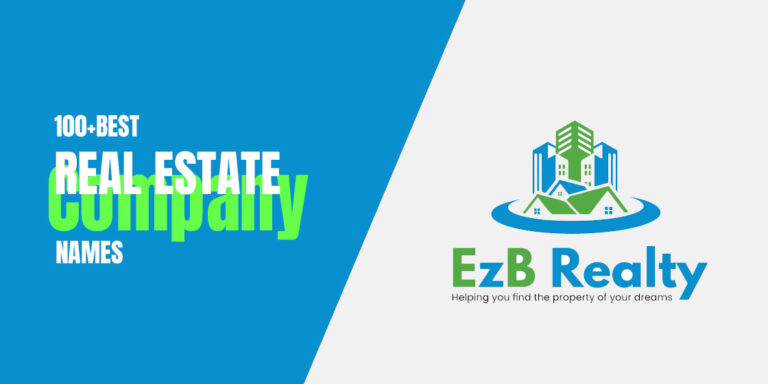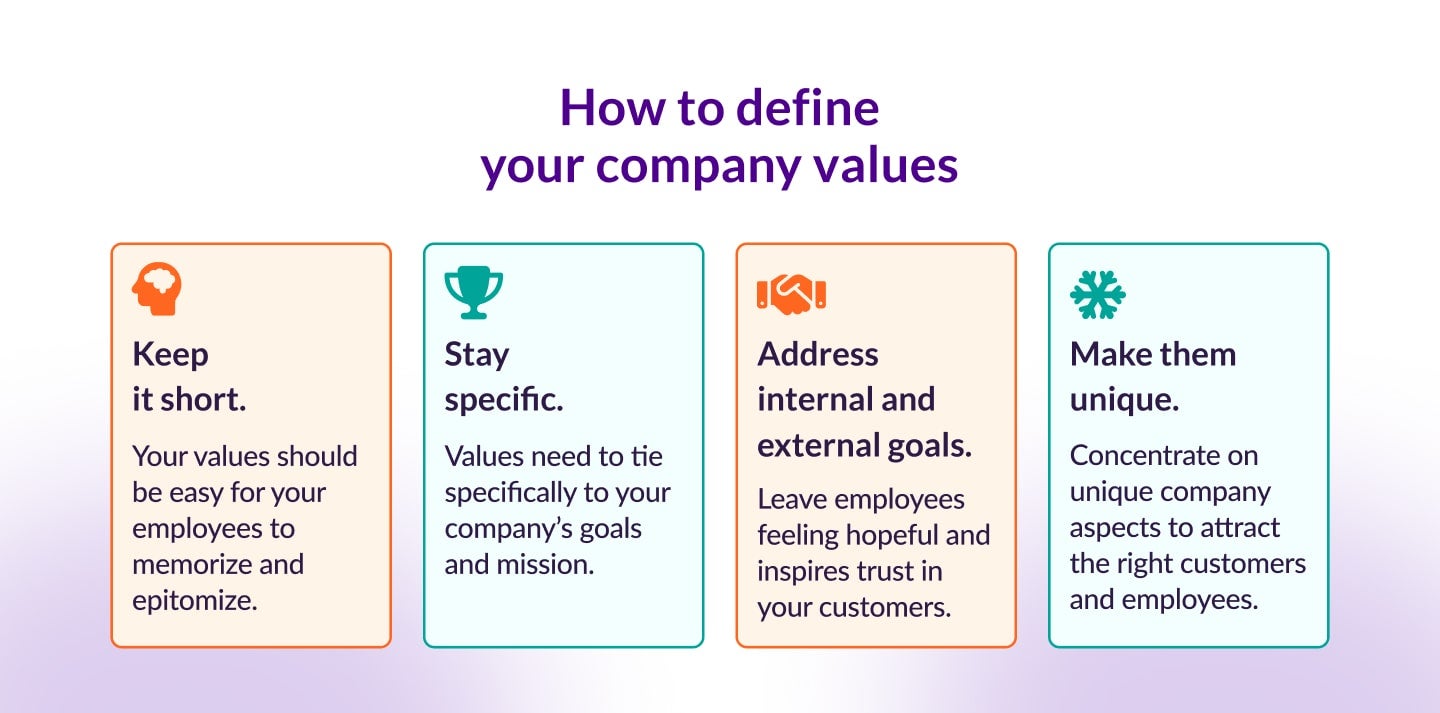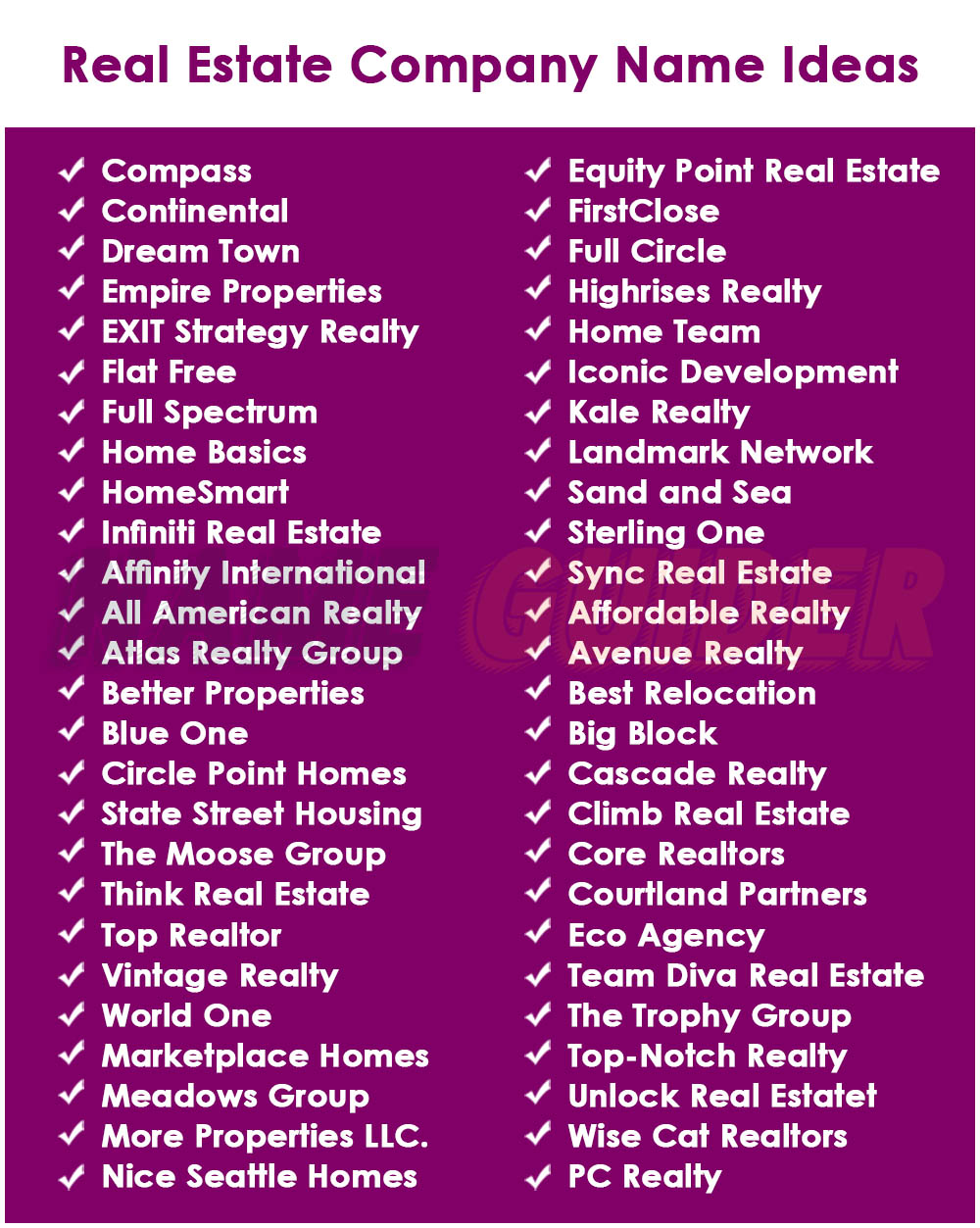Why a Great Name Matters in the Real Estate Industry
In the competitive world of real estate, a well-crafted company name can be the key to standing out from the crowd and establishing a lasting impression on potential clients. A great name can convey a sense of professionalism, expertise, and customer care, setting the tone for a successful business. Good names for real estate companies are essential in creating a strong brand identity that resonates with target audiences.
A unique and memorable name can also have a significant impact on branding and marketing efforts. It can help to differentiate a company from its competitors, making it more likely to be remembered and recommended by satisfied clients. Furthermore, a well-chosen name can influence customer perception, building trust and credibility with potential clients.
For instance, a real estate company name that incorporates the location or services offered can help to establish a sense of local expertise and specialization. This can be particularly effective in attracting clients who are looking for a company with in-depth knowledge of the local market. On the other hand, a name that conveys a sense of innovation and forward-thinking can appeal to clients who are looking for a company that is proactive and adaptable.
Ultimately, a great name is just the starting point for building a successful real estate company. However, it is a crucial element in establishing a strong brand identity and creating a lasting impression on potential clients. By choosing a name that reflects the company’s values and mission, real estate businesses can set themselves up for success and establish a reputation as a trusted and reliable partner in the industry.
Brainstorming Ideas for Your Real Estate Company Name
When it comes to brainstorming ideas for a real estate company name, there are several strategies to consider. One approach is to incorporate the location or services offered by the company into the name. For example, a company that specializes in coastal properties could include the word “coast” or “shore” in its name. Similarly, a company that offers property management services could include the word “manage” or “properties” in its name.
Another approach is to focus on the values and mission of the company. For instance, a company that prides itself on its customer service could include the word “care” or “service” in its name. A company that emphasizes its expertise and professionalism could include the word “pro” or “experts” in its name.
It’s also important to consider the tone and personality of the company when brainstorming name ideas. A company that wants to convey a sense of fun and approachability could use a playful or creative name. A company that wants to convey a sense of sophistication and luxury could use a more elegant or refined name.
Some other tips for brainstorming name ideas include:
- Use a thesaurus to come up with synonyms for key words and phrases
- Experiment with different word combinations and phrases
- Get feedback from colleagues, friends, and family members
- Research the names of other companies in the industry to get inspiration and avoid duplication
By using these strategies and tips, real estate companies can come up with good names for their business that reflect their values, mission, and personality. A well-chosen name can help to establish a strong brand identity and create a lasting impression on potential clients.
How to Choose a Name that Reflects Your Company’s Values and Mission
When it comes to choosing a name for a real estate company, it’s essential to consider the values and mission of the business. A name that reflects the company’s values and mission can help to establish a strong brand identity and create a lasting impression on potential clients. Good names for real estate companies should convey a sense of professionalism, expertise, and customer care.
One way to ensure that the company name reflects the values and mission is to consider the company’s unique selling proposition (USP). What sets the company apart from its competitors? What values does the company want to convey to its clients? For example, a company that prides itself on its customer service could include the word “care” or “service” in its name.
Another approach is to use a name that reflects the company’s mission statement. For instance, a company that aims to provide innovative and creative solutions to its clients could include the word “innovate” or “create” in its name. A company that values community involvement could include the word “community” or “local” in its name.
It’s also important to consider the tone and personality of the company when choosing a name. A company that wants to convey a sense of fun and approachability could use a playful or creative name. A company that wants to convey a sense of sophistication and luxury could use a more elegant or refined name.
Some examples of real estate company names that reflect the company’s values and mission include:
- “Care Realty” – a company that prides itself on its customer service
- “Innovate Properties” – a company that aims to provide innovative and creative solutions to its clients
- “Community Realty Group” – a company that values community involvement
By choosing a name that reflects the company’s values and mission, real estate companies can establish a strong brand identity and create a lasting impression on potential clients.
Real Estate Company Name Ideas to Get You Started
Here are some creative and inspiring name ideas for real estate companies to get you started:
- Location-based names: Consider incorporating the name of your city, state, or region into your company name. Examples include “New York City Realty” or “California Coast Properties.”
- Service-based names: Emphasize the services you offer, such as “HomeFinder Realty” or “Property Management Pros.”
- Value-based names: Convey the values that set your company apart, such as “Integrity Realty” or “Customer Care Properties.”
- Creative names: Think outside the box and come up with a unique name that reflects your company’s personality, such as “Keyhole Realty” or “Nest Realty Group.”
Some successful real estate companies and their naming strategies include:
- Zillow: A playful name that combines “zillions” and “pillow” to convey a sense of comfort and abundance.
- Redfin: A name that combines “red” and “fin” to convey a sense of energy and expertise.
- Realtor.com: A name that incorporates the word “realtor” to convey a sense of professionalism and authority.
Remember, the key to a great real estate company name is to make it memorable, easy to spell, and easy to pronounce. Avoid names that are too generic, too long, or too similar to existing companies. With a little creativity and inspiration, you can come up with a name that reflects your company’s values and mission.
The Role of Branding in Creating a Memorable Real Estate Company Name
Branding plays a crucial role in creating a memorable real estate company name. A well-crafted brand identity can help to establish a strong reputation, build trust with clients, and differentiate a company from its competitors. Good names for real estate companies should be consistent with the company’s overall brand strategy and messaging.
A consistent visual identity is essential for creating a memorable brand. This includes the use of a specific color scheme, typography, and logo. A well-designed logo can help to create a lasting impression and make a company more recognizable. For example, a real estate company that specializes in luxury properties could use a sleek and modern logo to convey a sense of sophistication and high-end quality.
Tone of voice is also an important aspect of branding. A company’s tone of voice should be consistent across all marketing channels, including the company name, tagline, and website content. A friendly and approachable tone of voice can help to create a sense of warmth and welcoming, while a professional and formal tone of voice can convey a sense of expertise and authority.
Some examples of real estate companies that have successfully created a memorable brand identity include:
- Zillow: Zillow’s brand identity is built around a friendly and approachable tone of voice, with a focus on providing helpful and informative content to homebuyers and sellers.
- Redfin: Redfin’s brand identity is built around a modern and sleek visual identity, with a focus on providing innovative and technology-driven real estate services.
- Realtor.com: Realtor.com’s brand identity is built around a professional and authoritative tone of voice, with a focus on providing accurate and up-to-date real estate listings and information.
By creating a consistent brand identity and messaging, real estate companies can establish a strong reputation and build trust with clients. A well-crafted brand identity can also help to differentiate a company from its competitors and create a lasting impression on potential clients.
Avoiding Common Mistakes When Naming Your Real Estate Company
When it comes to naming a real estate company, there are several common mistakes to avoid. These mistakes can make it difficult to establish a strong brand identity and can even lead to confusion among potential clients. Good names for real estate companies should be unique, memorable, and easy to spell.
One common mistake is choosing a name that is too generic. A generic name can make it difficult to stand out from the competition and can even lead to confusion among potential clients. For example, a name like “Real Estate Company” is too generic and doesn’t provide any unique value proposition.
Another common mistake is choosing a name that is too long. A long name can be difficult to remember and can even be confusing. For example, a name like “The Real Estate Company of America” is too long and can be shortened to something more memorable.
Choosing a name that is too similar to an existing company is also a common mistake. This can lead to confusion among potential clients and can even lead to trademark issues. For example, a name like “Zillow Realty” is too similar to the existing company Zillow and can lead to confusion.
Some other common mistakes to avoid when naming a real estate company include:
- Using numbers or special characters in the name
- Using a name that is too similar to a competitor’s name
- Using a name that is too generic or descriptive
- Using a name that is too long or difficult to spell
By avoiding these common mistakes, real estate companies can establish a strong brand identity and create a lasting impression on potential clients. A well-chosen name can help to differentiate a company from its competitors and can even lead to increased brand recognition and loyalty.
How to Test and Refine Your Real Estate Company Name
Once you have a list of potential names for your real estate company, it’s essential to test and refine them with your target audience. This will help you determine which name is most effective and resonates with your potential clients. Good names for real estate companies should be memorable, easy to spell, and easy to pronounce.
One way to test your company name is to conduct a survey or focus group with your target audience. Ask them to provide feedback on the names you are considering, including what they like and dislike about each name. This will give you valuable insights into how your target audience perceives your company name.
Another way to test your company name is to use online tools such as Google Trends or social media to see how people are reacting to your name. You can also use online polls or surveys to gather feedback from a larger audience.
When refining your company name, consider the following factors:
- Uniqueness: Is the name unique and memorable?
- Clarity: Is the name easy to understand and pronounce?
- Relevance: Is the name relevant to your business and target audience?
- Brandability: Can the name be used as a brand identity?
By testing and refining your company name, you can ensure that it is effective and resonates with your target audience. A well-chosen name can help to establish a strong brand identity and create a lasting impression on potential clients.
Some examples of real estate companies that have successfully tested and refined their names include:
- Zillow: Zillow tested several names before settling on its current name, which is now synonymous with online real estate.
- Redfin: Redfin refined its name to better reflect its brand identity and values.
- Realtor.com: Realtor.com tested its name with its target audience to ensure it was memorable and easy to spell.
By following these examples and testing and refining your company name, you can create a strong brand identity that resonates with your target audience.
Finalizing Your Real Estate Company Name and Tagline
Once you have tested and refined your real estate company name, it’s time to finalize it and create a tagline that complements it. A good tagline should be short, memorable, and reflective of your company’s values and mission. Good names for real estate companies should be accompanied by a tagline that reinforces the brand identity.
When finalizing your company name, make sure to check if the name is available as a web domain and social media handle. This will ensure that you can create a consistent online presence and avoid any potential branding conflicts.
Some tips for creating a great tagline include:
- Keep it short and memorable
- Make it reflective of your company’s values and mission
- Use action words or verbs to create a sense of movement and energy
- Avoid clichés and overused phrases
Some examples of real estate companies with great taglines include:
- Zillow: “Find your way home” – a simple and memorable tagline that reinforces Zillow’s mission of helping people find their dream home.
- Redfin: “Real estate, redefined” – a tagline that reflects Redfin’s commitment to innovation and customer satisfaction.
- Realtor.com: “The official site of the National Association of Realtors” – a tagline that reinforces Realtor.com’s authority and expertise in the real estate industry.
By finalizing your company name and tagline, you can create a strong brand identity that resonates with your target audience and sets you apart from the competition.






